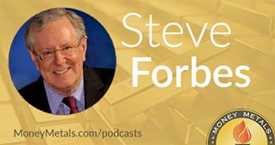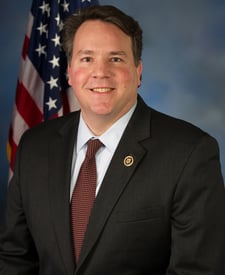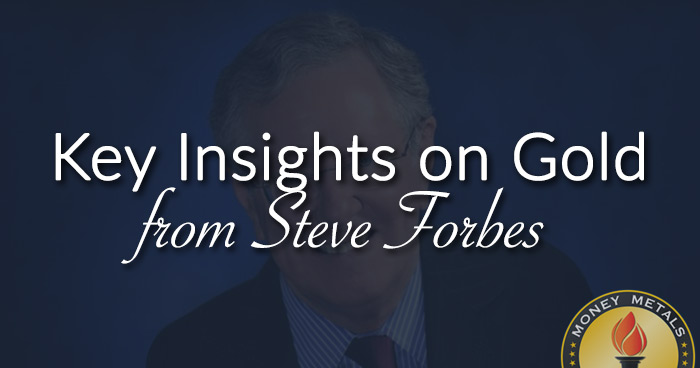Excerpted from his recent Money Metals podcast appearance
Mike Gleason, Money Metals Exchange: It is my great privilege now to speak with Steve Forbes, Editor-in-Chief of Forbes Magazine. He’s a prolific author and also a two-time presidential candidate, having run in the Republican primaries in both 1996 and in the year 2000.
Mr. Forbes, I want to thank you for your time today and for joining us again.
Steve Forbes, Forbes Magazine CEO: Good to be with you. Thank you.

Mike Gleason: A lot of gold has been flowing from West to East in recent years. That trend seems to have accelerated lately. What do you make of the growing central bank gold reserves, particularly in the East?
Steve Forbes: Well, the dollar is the currency of the world, just out of convenience and the size and importance of the U.S. economy. Our capital markets, for example, are much broader, deeper, and more sophisticated than those of any other country.
In Europe, for example, most of their capital still comes from large banks, one reason why they don't have the vibrant smaller company sector that we traditionally have had in the U.S. But the flow of gold to Asia, part of that is hedging, and part of it too is, I wouldn't be surprised if one of those countries doesn't move towards more of a gold-based standard, monetary system.
Just the other day, the prime minister of Malaysia proposed a gold standard as a way of replacing the dollar, having gold-backed currency. If China did it, that would be an enormous change.
And so I think one, they want the gold just as a hedge, but two, I think one of them may have the idea of going to a new gold-based monetary system, which would be good. The dollar needs competition.
Mike Gleason: Do you look at that the rapid flow of gold to Russia and China as an issue of national security in the long run?
Steve Forbes: It doesn't matter who holds the gold. It's a broad international market. Every ounce of gold that's been mined is still with us on Earth somewhere.
And national security comes from not somebody holding some gold but from the fact that we haven't learned yet, even though we once knew how to do it, of a stable dollar, strong, stable dollar, which would be tying it to gold as we did under a gold standard right up until the 1970s.
We did it for 180 years, and it worked pretty well. So the threat is an unstable currency, not who owns particular pieces of gold.
Gold is like a measuring rod, a ruler. It just measures value. It's not using gold coins to buy stuff at Walmart. It's like 12 inches in a foot or 60 minutes in an hour. And it's worked for 4,000 years when people have done it and done it right.
Again, in terms of the currency, we once knew how to do it. I think we can learn quickly how to do it again. If not, I'll be glad to show them in my books. That's the threat, is we have an unstable dollar, because it hurts us and the world.
Mike Gleason: U.S. Congressman Alex Mooney of West Virginia recently introduced a bill in Congress to eliminate capital gains related to sales of gold and silver. Give us your thoughts on that bill and the IRS rule that taxes nominal capital gains on precious metals, which the Constitution says is money.

Rep. Alex Mooney (R-WV) has legislation
to end income taxes on gold and silver.
Steve Forbes: Well, if you buy, say, 10 $1 bills for a $10 bill, you would be very surprised if the government said, "Oh, you should pay sales tax on that purchase," or something like that. So, what should be done is the capital gains levy should be eliminated anyway on all things, and it should be eliminated certainly on gold and perhaps silver as well because it hurts having an alternative currency.
Governments like to have monopolies, but the best way to have governments behave themselves is by people having an alternative.
I'm surprised the cryptocurrency world hasn't come up with a stable cryptocurrency, but in the meantime, gold should not be subjected to capital gains tax. It should not be subjected to sales taxes, any more than buying 20 $1 bills should be subjected to a sales tax.
Mike Gleason: I'm curious, how do you view gold as an investment? Some also consider it more like an insurance product, financial insurance in a way. How do you view it in terms of an asset class or an investment?
Steve Forbes: Gold is an insurance policy. And you should have it because you never know what our political leaders are going to do. Whether you're comfortable with 5%, or 10%, pick a number, but it should be there, even though people say well, other assets have done better over time. Well, that's just a reflection of currency fluctuations.
Gold keeps its intrinsic value better than anything else. When you see the nominal price change, that's not the value of gold changing, that's the value of the dollar or whatever currency you're talking about, changing in value.
Gold is the constant, like the North Star. Yes, you should have it, a piece of it, just for peace of mind.
Mike Gleason: In terms of precious metals, if we have an inflationary environment, if the Fed does get the inflation that they're looking for, what is your outlook for precious metals over, say, the medium to long term?
Steve Forbes: Well, it's very basic. Here you can plot a curve. When a central bank undermines the integrity of its currency, hard asset prices go up. Precious metals have been doing that for long before any of us were born, or even our ancestors.
We know it's going to happen. That's why you have a little bit of an insurance policy. These people don't know better.
Mike Gleason: Well, we'll leave it there. Mr. Forbes. It was a real pleasure, and we wish continued success to you and Forbes Magazine and Forbes Media. Thank you for everything you do for the causes of freedom, capitalism, and liberty.
Steve Forbes: Thank you. Have a good one.
For the full transcript and audio of Money Metals’ recent interview with Steve Forbes, please visit this page.

About the Author:
Mike Gleason is a Director with Money Metals Exchange, a precious metals dealer named "Best Overall" by Investopedia. Gleason is a hard money advocate and a strong proponent of personal liberty, limited government, and the Austrian School of Economics. A graduate of the University of Florida, Gleason has extensive experience in management, sales, logistics, and precious metals investing. He also puts his longtime broadcasting background to use, hosting Money Metals' weekly precious metals podcast since 2011, a program listened to by tens of thousands each week.





